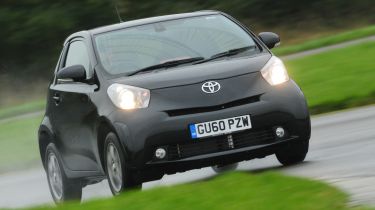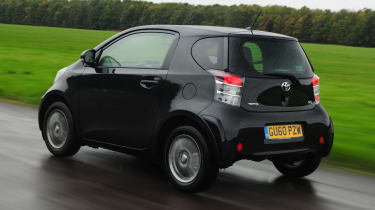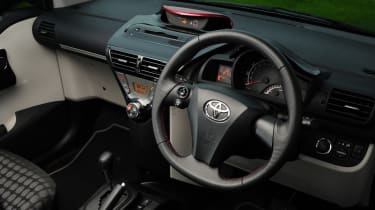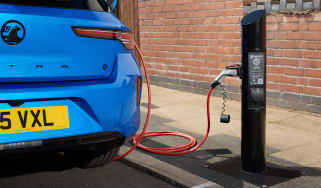Used Toyota IQ (Mk1, 2009-2015) review
A full used buyer’s guide on the Toyota IQ, which was on sale in the UK between 2009 and 2015
Verdict
It’s almost a decade since the last iQs were sold new in the UK, but this is still a car that has plenty of appeal for those who want a small urban runabout that’s cheap to run and offers a touch of luxury into the bargain. Wonderfully agile, decently refined, easy to park and cheap to run, the iQ has a lot going for it. We ran one on our long-term fleet and loved it, because it’s such a multi-talented city car, but as a new buy it was held back by Toyota’s ambitious pricing. Now that the iQ is very much a used car, prices are much more sensible. Just make sure you take it on an extended test drive to check that the tiny Toyota isn’t too small to fit into your life.
Toyota is one of the world’s biggest car makers, but also had a reputation for being one of the most conservative. With their safe designs and so-so dynamics, the firm’s cars were great for reliability, but they generally struggled to set the pulse racing.
However, Toyota embraced hybrid technology decades before pretty much everyone else (Honda being the key exception), and it has produced quite a few enthusiasts’ cars over the years. It also hasn’t been afraid to innovate, with one of its most interesting vehicles being the iQ city car that arrived almost 15 years ago. At less than three metres long but with the comfort of something bigger, the iQ provided superb urban transport.
History
The iQ arrived in January 2009, in 67bhp 1.0-litre form, with a choice of two trim levels and manual or Multidrive CVT automatic transmissions.
Used - available now

2023 Land Rover
Range Rover Evoque
33,698 milesAutomaticPetrol1.5L
Cash £22,500
2024 Skoda
Octavia Estate
50,100 milesManualPetrol1.5L
Cash £13,797
2020 Hyundai
Tucson
38,217 milesManualPetrol1.6L
Cash £13,497
2023 Ford
Focus
38,013 milesManualPetrol1.0L
Cash £13,697The 1.33-litre iQ introduced in July 2009 provided a useful boost in performance, with 97bhp and 92lb ft of torque; it came in range-topping 3 trim only, though. Around the same time, Toyota announced a partnership with Aston Martin to create a new iQ-based luxury city car – the Cygnet.
A range of fresh interior finishes (including black leather) and exterior paint colours were introduced in July 2010, when both of the iQ’s engine choices became Euro 5-compliant. Customisation options appeared in January 2012, including half a dozen different decals for the exterior, along with a six-strong range of colours for those who opted for the leather-trim upgrade.
Which one should I buy?
The key decisions when considering the purchase of a Toyota iQ are which engine and transmission to go for. The 1.33-litre unit is more muscular at the top end than the 1.0 litre, but the smaller engine is tuned for more low-down torque, and only this powerplant with a manual gearbox has free vehicle tax (although no iQ is costly to tax).
The Multidrive auto is a continuously variable transmission, but it feels better than most other CVTs, so don’t be scared to consider one. Also, don’t shy away from an entry-level car, because they’re not spartan; standard kit includes ESP, nine airbags, electric windows, a six-speaker hi-fi, air-con and remote central locking.
The iQ2 (1.0) and iQ3 (1.33) had the same standard equipment plus keyless go, automatic headlights and wipers, climate control and the options of sat-nav and leather trim.
Alternatives to the Toyota IQ
Few cars are as small as the iQ; the Smart ForTwo is the obvious rival, but it’s strictly a two-seater, so there’s no space even for small children, unlike in the iQ. However, the ForTwo is well built and frugal, especially in diesel form.
If four seats are key, an iQ probably isn’t for you, but the Smart ForFour is a neatly styled option, along with the related Renault Twingo. Other four-seater city cars worth a closer look are the Kia Picanto, Fiat Panda and Ford Ka, as well as the Hyundai i10.
The Volkswagen up! and its close cousins the Skoda Citigo and SEAT Mii are also excellent contenders, as is Toyota’s own Aygo, along with the closely related Citroen C1 and Peugeot 107/108, but most of these alternatives feel less premium than the iQ.
What to look for
Economy
Low MPG can be an issue on fast journeys when you have to use high revs. The fuel gauge isn’t linear, so can be confusing, too.
Bulbs
Headlamps are fine for urban use, but they can struggle on rural roads. Aftermarket bulbs will transform things, for less than £20.
Spare
All iQs had alloys as standard and there’s no spare wheel well, but a steel spare is available (part T42611-74010) to put in the boot.
EGR valve
Toyota initially fitted an EGR (Exhaust Gas Recirculation) valve that could lead to a loss of power. A redesigned part was fitted from 2011.
Safety
It would be easy to think that the iQ’s diminutive proportions must make it feel unsafe on the road, but in Euro NCAP’s tests the iQ notched up a maximum five-star score, courtesy of a comprehensive suite of driver-assistance systems and nine airbags, including a pioneering rear-window curtain-shield airbag.
Interior
The iQ’s cabin is cleverly packaged, built to a high standard and it’s also extremely well equipped. But despite Toyota’s assertion that this is a four-seat car, you’ll struggle to get more than three adults in there because there simply isn’t the legroom to fit four inside; the asymmetrical dashboard means that the front passenger can sit farther forwards than the driver, allowing an adult to sit behind. You can fit two adults and two children into an iQ, but in this mode the boot will accommodate just 32 litres, and even with the seats folded, this increases to only 238 litres.
Running costs
The iQ needs maintenance every 12 months or 10,000 miles, with services alternating between minor and major. These are priced at a hefty £230 and £315 respectively if you choose to use a Toyota franchise, those costs having almost doubled in the past decade or so. On top of this, the brake fluid has to be replaced every two years at a cost of £59 if done separately, but this is included in the price of the major service.
The coolant should be renewed after 100,000 miles or 10 years, and then every six years or 60,000 miles, at a cost of £79. Given that both the 1.0 and 1.3-litre engines are chain driven, there’s no cambelt to renew.
The iQ came with a five-year/100,000-mile warranty when new, but using an official dealer extended this by 12 months or 10,000 miles per year, up to a limit of 10 years or 100,000 miles, so only the last iQs may still have any official warranty cover remaining.
Recalls
The iQ has been recalled four times, the first for the sticking throttle problem that caused Toyota’s reputation so much damage in February 2010; cars built up to January 2010 were affected. iQs built up to October 2010 could suffer from problems with the electric power-steering system, which is why they were recalled in December 2010.
The third recall was issued in June 2011. It affected cars built up to May 2010, which could experience problems with the brake servo leading to a loss of braking assistance, but not failure of the braking system altogether. The most recent recall came in January 2015, because some iQs made up to November 2014 could suffer from oil accumulating in the turbocharger, which may potentially lead to a fire.
Driver Power owner satisfaction
The iQ didn’t sell in large enough numbers to make it into any of our Driver Power new or used-car surveys, but when the car was in production, the brand as a whole was typically coming mid-table in reader polls. A better idea of the iQ’s talents can be gleaned from owner reviews submitted to carbuyer.co.uk, with the Toyota averaging a score of 4.4 out of 5. Only three reviews awarded the iQ less than four stars.
Looking to sell your current car quickly and for a good price? Try our Free Car Valuation tool today!






